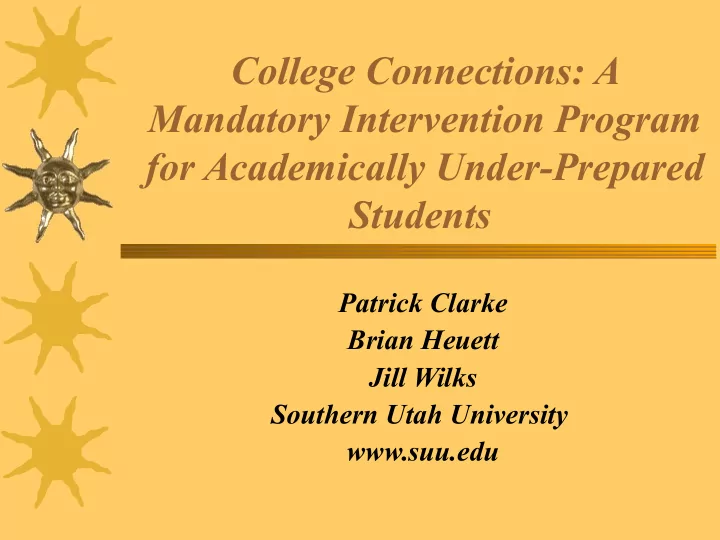

College Connections: A Mandatory Intervention Program for Academically Under-Prepared Students Patrick Clarke Brian Heuett Jill Wilks Southern Utah University www.suu.edu
Overview of Presentation Introduce the College Connections Program Concept and Components Tie in Learning Theory and Design for Learning Concepts Question and Answer
Relevant Issues Students admitted who do not meet minimum admission’s criteria, or barely meet admission’s criteria SUU needs to embrace a proactive stance Unique perspectives regarding math and writing Implement strategies that are informed by learning theory and substantiated by effective models
Program is a Pilot Retention rates and index scores – Students admitted below SUU’s index score of 80 (3 year average retention rate of 55%) – Students admitted with indexes between 80 and 84 (3 year average retention rate of 41%) – Similar retention numbers exist for students with index scores between 84 and 90 Potential for expansion
Components Three-week summer bridge program Required living & learning experience throughout the academic year Peer mentors
Inspiration for Design The Eckerd College “Autumn Term” Various Summer Bridge Models Changes in the way developmental math is taught at SUU Success with mandatory writing lab for low index students at SUU
Assessment of Developmental Math New approach implemented fall 2004 – Major focus on out-of-class support activities – Collaboration with Student Support Services – Math 0900 (Pre-algebra) • Before new approach: 68% pass rate for math 0900 • After new approach: 80% pass rate for math 0900 – Math 0990 (Introduction to Algebra) • Before new approach: 62% pass rate for math 0900 • After new approach: 88% pass rate for math 0990
Assessment of Developmental Writing Students with low ACT and SAT scores in English must take ENGL 1000 with ENGL 1010 (Intro. to Academic Writing) – Significant increase in the use of the SUU Writing Center among these students – Active participation in ENGL 1000 correlates to pass rates for ENGL 1010
Basic Components of Summer Bridge UNIV 1015 – Three credit hour course beginning August 8 th Serves as admission requirement Unique focus regarding developmental math and writing Community building & success skills Extended orientation to campus
Math in UNIV 1015? Revisit Multiplication Work with Student Support Services to address: – Math anxiety, perceived math disability, and stress management Address math phobia Make it fun! The idea is not to teach new concepts, but to meet students where they are and prepare them for entry into developmental math courses.
Writing in UNIV 1015? Address fears related to writing Go over basic writing skills Make writing projects fun! Groups of students will write comics – Fears about writing will be personified in the form of “villains” – Using what they are learning in the class, students will write storylines about how they beat the “villains” with the skills and strategies they are learning The intent is to attempt to break down fears and increase confidence about writing
Focus on Connecting Students to SUU Connecting to faculty, staff, and other students Developing presentational skills Focus on confidence Focus on wellness issues Connecting to the university through clubs and organizations Extended orientation to campus
College Connections Learning Community Students required to live on designated floors and attend activities and programs on those floors throughout the year Building a new computer and academic resource lab where peer mentors will work with students. College Connections students will enroll in designated sections of UNIV 1000 (FYE) with Jill Wilks, SUU Learning Specialist
Academic Rigor Essential Summer connections about relaxing the student and gaining trust – Handshake history – Authorities are consultants, facilitators, not judges or labelers Learning communities & my FYE class: Academic rigor – Require and expect same as Honor student – Require authentic learning and honesty. – Must believe in and model value of higher education. – Must hold standards high and model the value of facing challenge. – Must believe all can do it…no matter past. – Time line on learning? Yes Empower disenfranchised to know how to learn, how to architect brain . – Roger’s unconditional positive regard – Learning theory – Quantum approach
Basic Learning Theory New definition of Intelligence Nature of Knowledge Dendrites Disequilibrium: Fight Flight Filters Neurotransmitters Voice Directive thinking: medical examples Learning and thinking take time
Design for Learning Train Faculty/Peer Leaders/Tutors in Learning – Believe in learning and potential – De-emphasize labels and judgment – Know self and biases – Allow brain-based learning to occur: integrate in curriculum and assignments Design elements – Focus on habits vs. skills – Teach self evaluation: authority vs authoritative – Create rich environments, expansive opportunity – Create learning communities: seminar and Output – Use peer mentors – Provide testing support
Your Input?! After this I realize… I was wondering… Comments, questions, concerns, complaints, compliments, emotional outbursts
Recommend
More recommend